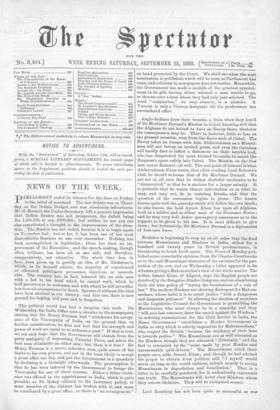Evidence is beginning to crop up on all sides that
the feud between Mussulmans and Hindoos in India, stilled for a hundred and twenty years by British predominance, is threatening to break forth again. The Times of Monday pub- lished some remarkable opinions from Sir Charles Crosthwaite as to the anti-Mussulman character of the societies for the pro- tection of the cow, and on Wednesday a letter appeared in its columns giving a Mahommedan's view of the whole matter. The writer, Ismael Khan, of Aligarh, says the English people are deceived by the Bengalee-Hindoo Congress, and are abandoning their old wise policy of "laying the foundations of a rule of law." The modern Hindoos are showing disrespect for Mahom- medans, whose habit it is to await justice "with a dangerous and desperate patience." In allowing the election of members to the Legislative Council the Government is proscribing the Mussulmans, who must always be in a minority, and they "will, as a last resource, draw the sword against the Hindoos." In ordering examinations for the Civil Service in India, the Home Government "establishes a Hindoo Government in India, to obey which is utterly impossible for Mahonunedans," who respect the Britieh "because the tendency of their laws is towards justice." The Mussulmans are as well educated as the Hindoos, though they are educated " Orientally," and the fact is concealed by the "noise made by your Hindoo and unreasonable quill-drivers." The Mussulmans ruled these people once, adds Ismael Khan ; and though he had advised his people to abstain from polities, still "I myself would never, so long as the world endures, submit tamely to seeing Mussulmans in degradation and humiliation." That is a letter to be carefully pondered, for it undoubtedly represents one truth. The Mussulmans will never obey Hindoos, whom they esteem idolaters. They will be extirpated sooner.


































